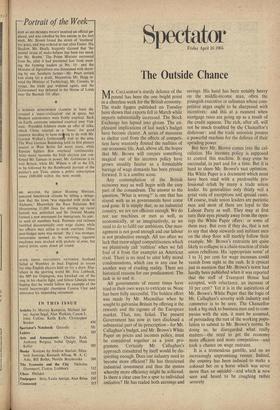The Outside Chance
MR. CALLAGHAN'S sturdy defence of the pound has been the one bright point in a cheerless week for the British economy. The trade figures published on Tuesday have shown that exports fell in March while imports substantially increased. The Stock Exchange has lapsed into gloom. The un- pleasant implications of last week's budget have become clearer. A series of measures to shelter coal from the effects of competi- tion have wantonly flouted the realities of our economic life. And, above all, the hopes that Mr. Brown will conjure something magical out of his incomes policy have grown steadily fainter as a formidable barrage of wage demands has been pressed forward. It is a sombre scene.
Any contemplation of the British economy may as well begin with the easy part of the conundrum. The answer to the question, 'What is wrong?' is one that has stayed with us as governments have come and gone. It is simply that, as an industrial country, we are not efficient enough. We do not use machines or men as well, as economically, or as imaginatively, as we need to do to fulfil our ambitions. Our man- agement is not good enough and our labour is not productive enough. All too often we lack that razor-edged competitiveness which we plaintively call 'ruthless' when we fall foul of it from (for example) an American rival. There is no need to utter lofty moral condemnations, which can in any case be another way of evading reality. There are historical reasons for our predicament. The task is to- end it.
All governments of recent times have tried in their own ways to extricate us. None has been fully successful. The boldest effort was made by Mr. Macmillan when he sought to galvanise Britain by offering it the rewards and the rigours of the European market. That, too, failed. The present Government has now in turn disclosed a substantial part of its prescription—for Mr. Callaghan's budget, and Mr. Brown's White Paper on prices and incomes policy, must be considered together as a joint pro- gramme. Certainly Mr. Callaghan's approach considered by itself would be dis- spiriting enough. Does our industry need to become more efficient? He has threatened industrial investment and thus the means whereby more efficiency might be achieved. Is there a clear case for a spur to individual initiative? He has raided both earnings and savings. His hand has been notably heavy on the middle-income man, often the youngish executive or salesman whose com- petitive urges ought to be sharpened with incentives: and this at a moment when mortgage rates are going up as a result of the credit squeeze. The rich, after all, will not be much troubled by the Chancellor's disfavour: and the trade unionists possess a powerful machine for the defence of their spending power.
But here Mr. Brown comes into the cal- culation. His incomes policy is supposed to control this machine. It may even be successful, in part and for a time. But it is hard to share Mr. Brown's vast optimism.
His White Paper is a document which must have been read with a pardonable pro- fessional relish by many a trade union leader. Its generalities only thinly veil a great vista of exceptions and special cases.
Of course, trade union leaders are patriotic men and most of them are loyal to the Labour Party as well. They may at first turn their eyes piously away from the open- ings the White Paper offers: or some of them may. But even if they do, that is not to say that shop stewards and militant men on the shop floor will meekly follow their example. Mr. Brown's restraints are quite likely to collapse in a chain-reaction of trade union rebellions. His 'appropriate norm' of 3 to 31 per cent for wage increases could vanish from sight in the rush. Is it cynical just 6 mention that Mr. Brown's norm had hardly been published when it was reported that the staff of Transport House had accepted, with reluctance, an increase of 10 per cent? Yet it is in the aspirations of Mr. Brown's White Paper that the logic of Mr. Callaghan's severity with industey and commerce is to be seen. The Chancellor took a big stick to business men and to com- panies with the aim, it must be assumed, of persuading the rest of the working popu- lation to submit to Mr. Brown's norms. In doing so, he disregarded what really matters—the need to get the economy more efficient and more competitive—and took a chance on wage restraint.
It is a tremendous gamble, and on an increasingly unpromising runner. Indeed, the country has been induced to make a colossal bet on a horse which was never, more than an outsider—and which is now seen and heard to be coughing rather severely.






























 Previous page
Previous page